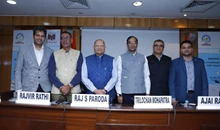
A Draft Integrated Plant Nutrition Management Bill, which has been circulated in the public domain for feedback, proposes to control fertilizer prices, supply, and imports through a regulatory body, a move that has sparked outrage among industry and farmer groups, who have compared it to the "inspector raj."
According to the draft bill, “Cente may, by notification in the Official Gazette, fix the maximum prices or rates at which any fertilizer may be sold by a dealer, manufacturer, importer, or fertilizer marketing entity in order to regulate the equitable distribution of fertilizers and make fertilizers available at fair prices. The Cente may, taking into account the local conditions of any area, the period of storage of fertilizers, and other relevant circumstances, set different prices or rates for fertilizers with different storage periods, or for different areas, or for different classes of consumers.”
According to industry experts, the current Fertilizer Control Order is more than adequate for dealing with emergency situations, and putting such draconian provisions under a separate Act may result in the return of the "inspector raj," reminiscent of the pre-1991 era.
Liberalize Fertilizer Sector
"If we regain control, both inspector raj and corruption will return." "The government should completely liberalize the fertilizer sector, perhaps in stages, by providing subsidies through direct cash transfers to farmers, as this will also aid in the introduction of new products based on nutrient requirements," said P K Joshi, former director of the International Food Policy Research Institute (South Asia).
The draft Bill provides for the establishment of an Integrated Plant Nutrition Management Authority of India, which will “regulate the manner of registration for manufacturers of fertilizers, set technical standards with respect to the quality of fertilizers and fertilizer products, and promote the sustainable use and development of innovative fertilizers.”
The draft Bill states that the Authority, Union, and State governments will be responsible for enforcing this law. It also empowers the Centre to take "suo motu cognizance" of any irregularities in the actions of manufacturers, dealers, or retailers and to initiate action for inquiry or to direct the State Controller to investigate the matter. It has also given states the authority to appoint "State Controllers of Fertilizers."
Appointment of Fertilizer Inspector
However, the industry is dissatisfied with the provision regarding the appointment of a Fertilizer Inspector. According to the bill, "the State Government, or the Centre, by notification in the Official Gazette, appoint such a number of persons as it thinks necessary and possessing such technical and other qualifications as may be prescribed by way of rules issued by the Centre to be Fertilizer Inspector for the purpose of this Act and any rules and regulations made thereunder to be Fertilizer Inspector for the purpose of this Act and any rules and regulations made thereunder."
It goes on to say that a fertilizer inspector may seek "any information in their possession from any manufacturer, importer, fertilizer marketing entity, wholesale dealer, or retailer" about the manufacture, storage, and disposal of fertilizers. The inspector may also "enter and search any premises where any kind of fertilizer is manufactured or imported or stored or exhibited for sale if the fertilizer inspector has reason to believe that any fertilizer has been or is being manufactured/imported, sold, offered for sale, stored, exhibited for sale, or distributed in contravention of any provision of this Act or the rules made under it."
The inspector has the authority to seize or confiscate any fertilizer that he believes violates the quality standards established by this Act. "At the moment, district magistrates have the authority to take action to ensure the availability of fertilizers and to combat black marketing." We have not come across any major incidents of misuse of the Fertilizer Control Order because they are entirely responsible. "However, creating posts of inspectors with such broad powers is simply bad in a free market economy," said an anonymous CEO of a major fertilizer company.











